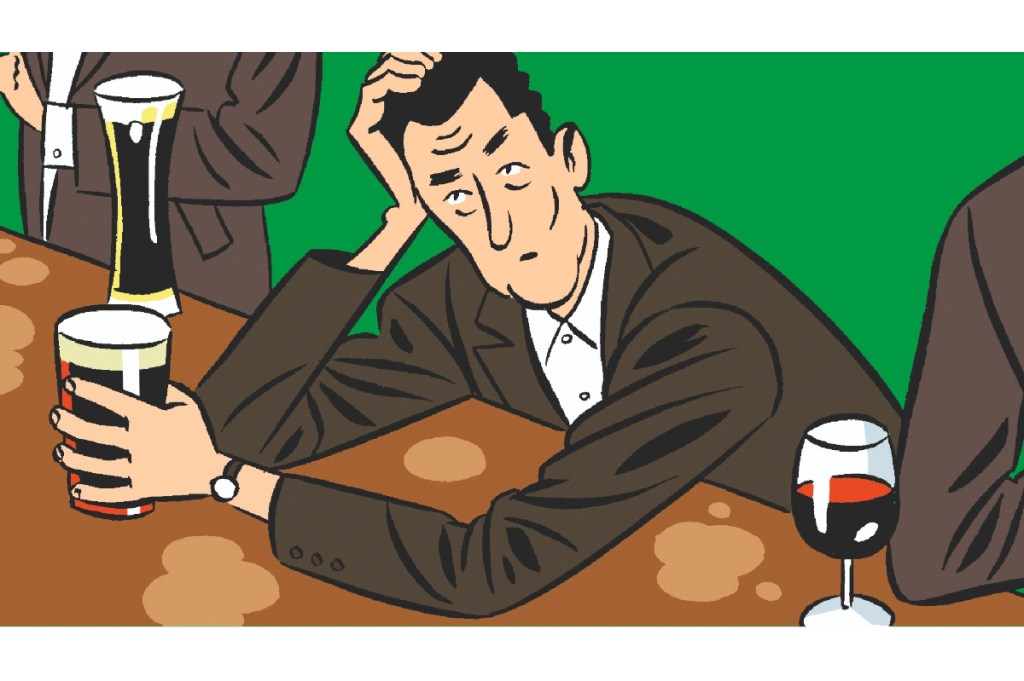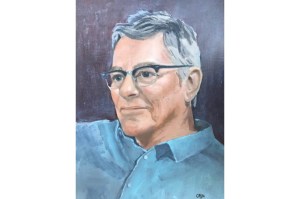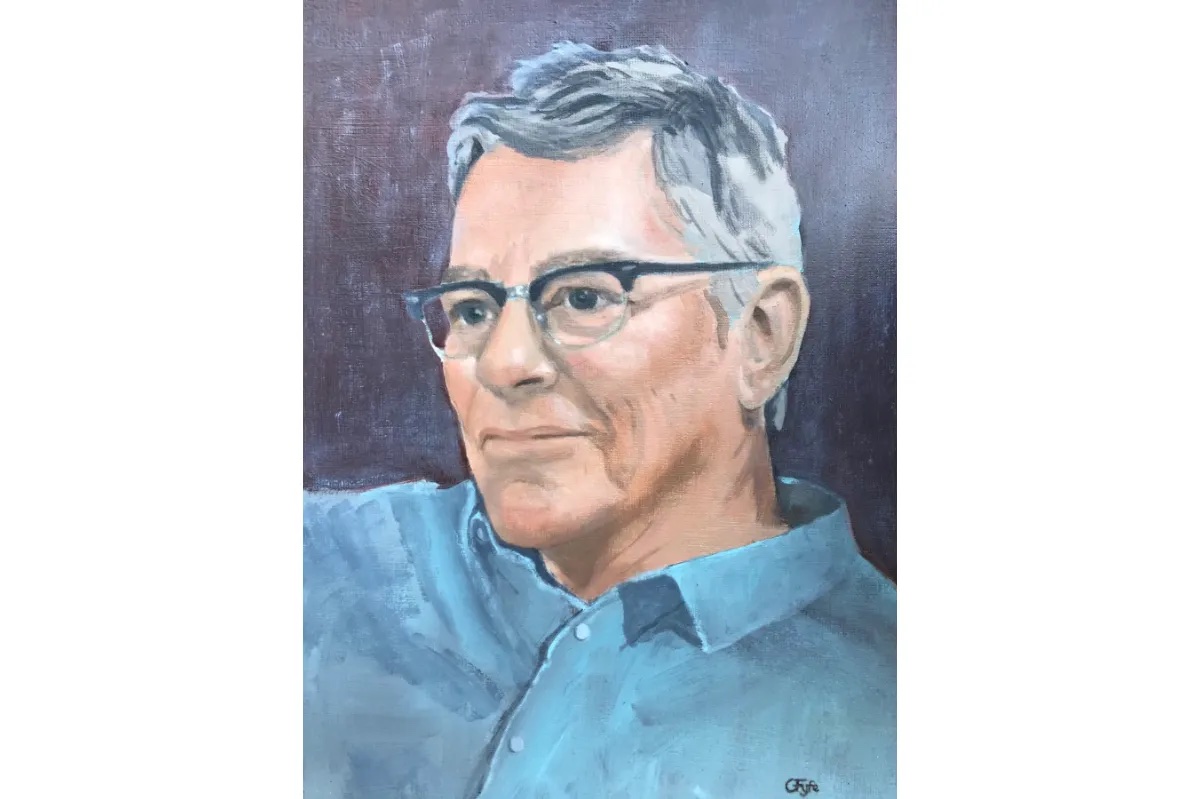Boris Johnson
When Jeffrey Bernard died in 1997, it seemed possible that we would never again have a regular Low Life columnist in The Spectator — or no one half as good. We needed someone who could match Taki for appalling frankness, for saying the unsayable; but not about the denizens of Gstaad or New York nightclubs.
Low Life meant the opposite milieu. We needed our man with the half-eaten packet of prawn cocktail flavor crisps and the monster hangover, our man in the pub lock-in, the ferret show, the debtors’ court, the A&E at 3 a.m. with the drunk guy going crackers. It had to be someone who knew how to argue with social workers.
We needed a new literary Hogarth. After a few years of struggle and several false starts we found him; or someone even better, someone with that rare ability to be both totally readable and transparently honest.
When we first approached Jeremy (we being Stuart Reid and I), he was almost overwhelmed with modesty. He venerated Bernard, he said. Were we sure that he was the right man for the job? We were, and so — with ever greater fervor — were our readers.
Jeremy understood the key ingredients of a Low Life column, at least as he produced them: one good gag, one arresting turn of phrase, one insight into modern low-life Britain and one simply hair-raising personal confession — sexual or medical or whatever — and the whole thing so carefully polished and thought through as to seem tossed off in ten minutes.
His genius was the unflinching analysis of his own weaknesses. His study was the human heart, in all its occasional ghastliness. The franker he was, the more we believed the central and unspoken point: that all things considered there is just as much joy and goodness and merriment in low life as in high life.
Probably more, in fact.
Professor Brian Cox
Over Christmas we visited Jeremy in his cave house. Catriona had warned us that he wasn’t his usual self, and it would be a short evening. Hours later, Low Life was thrashing around in fading pajamas, music loud, with a fifty-year-old French military cigarette we found at a Brocante in one hand and the dregs of a bottle of Champagne Xavier Loriot in the other. He told me he had to lie down for two days afterwards. There were occasions he treated terminal cancer like a hangover.
‘I told him last week that my son will grow up a better man for having known him. He liked that’
Jeremy was, as you sense from his column, much more than a peerless columnist. He was fearless, kind and sharp. Indestructible, I thought. You’d get smashed intellectually and physically with Jeremy when he was in the mood. Riotous but, no matter what the hour, able to zero in with precision on a sloppy or half-baked comment and continue the interrogation until you understood what you meant to say, although he’d have hated for me to call him an intellectual. I recently disagreed over the course of several hours with his assertion that manual labor alone is the route to understanding the universe. We converged on “necessary but not sufficient.”
The last time I saw him in person it was an early spring evening in the Var. He savored a bottle of Loriot, and we knew that was probably it. He loved his grandsons dearly, and was a surrogate grandfather to my son. I told him last week on our final call that my son will grow up a better man for having known him. He liked that.
Eric Idle
Jeremy was the dearest friend, the kindest companion, the sweetest of men and a wonderful writer. He was also, mercifully, a very naughty boy, or he couldn’t be a friend of mine. I was fortunate to be one of his French friends, a group of expats including David Chater, the foreign correspondent, whose identities and secret hideaways he kindly concealed so he could write about them. He dubbed me “Mr. Summer” from my preference for Californian winters and would mock my skill at turning up just when the weather turned out nice again. I would rant about people supporting West Hamsters and he would roar with laughter. He had the finest laugh and with Jeremy, laughter was never very far away. He loved a singalong and a gathering, except on a Monday when he disappeared into purdah for the torture of writing his column. We shared the secret hell of writing and I would email him whenever I was stuck and fed up and he would say he’d just sent another piece of rubbish to The Spectator and was off to cheer himself up in a World War One graveyard in Flanders. And certainly only war seems harder than writing. But he did it consummately. Not effortlessly of course, but his honest, bleak and yet still funny description of the undignified process of dying will, I suspect, always be read. Cheerful and brave during his long and painful exit, including, very romantically, getting married on his deathbed to Catriona, the love of his life, to the delight of the Marseille nurses, he made you feel you were the best person in the world. It’s quite possible he was.
David Chater
After many drunken dinner parties together in Provence, I used to dread what might appear in his next column (I was “the foreign correspondent”). But it was always vibrant, amusing and the admonishments were well-deserved (especially against the other guests). What a talent, what a writer and what a friend has left us. His last days have been harrowing but Catriona gave him both the love and the strength to endure them. What remains is a golden treasury of columns. Sometimes I’ve read them sipping gin and tonics in a bath shared with cockroaches in Moscow. At other times in Baghdad twitching with shock and awe. But every time they transported me into his world. Goodbye, old friend.
Rod Liddle
Jezza’s writing was so beautiful because it was always the truth, unsullied by prejudice, or what he thought people might want him to say, or what he thought he should say for the good of his career, or according to some political dictum. Just the truth. That’s also why he didn’t have much money. In a sense he approached pretty much every subject with the wide eyes of the ingénue, even if sometimes a pissed ingénue. He was a wonderful friend to have and we had some riotously drunken evenings together, chewing the fat and spitting it out. We had joined The Spectator at roughly the same time and considered ourselves, probably wrongly, as outsiders — both of us being from a social class several notches below the salt. He was West Ham and I was Millwall, but in an odd way what should have been a fierce enmity only accentuated our friendship. He came to my wedding — and wrote a lovely piece about it for this magazine — and was there at my daughter’s christening.
One day, while driving with my wife and sons through part of Devon, I saw this peculiar shambling figure by the side of the road, slowed down to get a better look and — yep, bizarre to say, it was Jezza. He came over to our holiday let and with great kindness took part in a fractious family game of Articulate. It was a lovely evening, even if, in those days, he was less contented, always worried about how his son was getting on and not truly settled. But the lovely Catriona anchored the man and he took so much pleasure in his grandkids. There have been few like him in Fleet Street. Few so open, and with a lack of side, front or spin. How I will miss him. And how we will miss his writing.
James Lewis-Clarke
My big brother Jeremy, or “Jum” as he is affectionately known by me and my sister, was the most voracious reader of books you’ll probably ever meet. He will be known to most of you as a writer, but to me he was a reader. He had hundreds upon hundreds of books and had read them all at least twice. He read people too. I suppose it’s what enabled him to write so well.
Jeremy also wrote from experience. If he hadn’t been anywhere or done anything, he often found it difficult to write a column. He wrote with brutal honesty; sometimes too much so. His favorite poem was Thomas Hardy’s “The Self-Unseeing.” It suited his melancholy streak.
He wrote at an old Ercol table that used to be the family dining table. He had three or four old typewriters and you could sometimes hear him bashing out his daily journal on one of them. He wrote every day, then locked it away in a drawer. I just heard him write it. He would bash on that old typewriter, then pause, mutter something to himself, let out one of those low hiccoughing laughs of his at something that had amused him, then carry on bashing it with two fingers.
We both loved dogs and West Ham and often walked, talked and laughed in the coastal countryside of the South Hams of Devon near to our mother’s house.
It was one of his heroes, Churchill, who said “Never trust a man who has not a single redeeming vice” and on that basis my brother was entirely trustworthy.
There was no doubting the bona fides of the man and, for all his well-documented faults, I loved him.
Liz Anderson
When I was handling Jeremy’s copy, he was asked to change from his fortnightly “No Life” column to a weekly “Low Life” one. He was full of self-doubt: he didn’t feel he could — or should — take over the name of the late, great Jeff Bernard’s column. Fortunately, he was persuaded. And so his weekly column began. It always read so fluently, but some weeks he really struggled, he told me: he needed reassuring that all was fine. And he was a delight to edit — mainly because he didn’t need much editing, though occasionally his description of an old girlfriend, or the girlfriend of a local fellow Devon pub-goer, just had to go. Despite his assurances that none of his comments about the women would be read by them as they could barely read and certainly never read The Spectator, the libel lawyer did not always agree.
‘He had hundreds upon hundreds of books and had read them all at least twice. He read people too’
We got to know his pub friends — Trev the builder, Mystic Mick and of course Sharon, who “is likely to go off with virtually anyone who cares to ask”; we followed his love and despair for West Ham — “a national laughing stock, and playing like a team of ruptured goats.”
Jeremy could be self-deprecating: “When I sat down to read my diary after banging away at it for a year, I realized what a colossal bore I am. There was no escaping it… I’ve always half-suspected I was a bore: now I had it in writing.” “A friend of a friend has been staying for a few weeks… She is as shallow as the Thames at Southend when the tide’s going out, but I quite like shallow. I’m shallow myself, come to think of it.” But boring and shallow Jeremy was not.
He loved My Boy and his grandsons Oscar — “light of my life, bringer of hope, and a future charismatic leader of the English resistance” — and Klynton: “Loves his grub. Eats anything. Loves his bed. Looks forward every night to going there. Settles down into it with an expression on his face of ineffable joy, just like his grandfather.”
I know I will miss this kind, funny, brave, generous, unusual man and his writing — but I feel lucky to have known him for more than twenty years.
Cass Pennant
Jeremy once took me along to a Spectator summer party and gladly introduced me on his rounds to Boris Johnson (before he was PM), Jeffrey Archer and Piers Morgan, then tried to create a bit of shock by saying: “Guys, he used to be a football hooligan, but now he’s a publisher and an author.” In return, I’d introduce him as Jeremy “Low Life” to the West Ham’s Inter-City Firm (ICF) and various other football-going “Top Boys” at my book launches. He genuinely enjoyed these experiences and even reflected on them in his column. One of my favorite instances of this was his excited reflections on his encounter with the notorious Bill Garner and Teddy Bunter (both ICF) in the gents’ toilets where he remarked on his surprise at how polite and gentlemanly they were with him. I suppose for him it was a chance to meet the “faces” that were the terrace legends of his younger football-going days.
‘I feel I’ve got to know him almost more intimately than many of my close friends, such is his candor’
On a serious note, I will always be grateful to him for his kindness and support in helping me further my career in the literature industry through a willingness to give my latest releases honest reviews and for giving me several door-opening introductions. I have many fond memories of him and we shared a lot of common interests, which usually linked back to sharing a few beers and the odd story or memory in the Chicken Run Bar when watching our West Ham play at Upton Park or in one of his preferred work locals, the Duke of York or the Two Chairmen. I’m so glad to have known you, Jel baby.
Ian Rankin
I have always been a fan of Jeremy Clarke’s writing but over the past year his has been the column I turn to first when my copy of The Spectator arrives. His beautifully elegant prose somehow makes his subject matter — his own mortality — more powerful. A recent piece dealing with his wedding had me in tears. I feel I’ve got to know him almost more intimately than many of my close friends, such is his candor. His unique perspective on life, love, illness and death will be missed.
Sophie Winkleman
Jeremy Clarke had a mighty literary gift. His writing was totally mysterious — deceptively modest and spartan yet somehow poetry, yearning and grace eddy beneath the plain surface. No flourishes or manipulation but entirely absorbing. I don’t know how he did it. He felt like a wonderfully English writer — genuinely self-deprecating with an eye for the absurd. Yet his tone never descended into anything false, mocking or bitter. I only know him from his writing but how I will miss him now he’s gone.
Ferdinand Mount
For months now, it seemed as if each issue might be the last. My wife and I still fought over the copy as it dropped through the letter box, with the unspoken fear that Jeremy might not be in this week. But he always was, the dispatches from the hospital trolley as bright as ever, the characters in his cramped world evoked with such brilliance in a few lines: the nervous medical student who plunges the needle in the wrong place, the jokey porter who pretends to assault the nurses, the old friends who persist in calling however hard he tries to put them off and the sunshine through the window and the birds twittering outside. As the morphine doses inched up, the prose seemed to become even more limpid. Every column had a joyful stoicism of the sort the ancients recommended. There have been other masters of the art of Unholy Dying: Jeffrey Bernard in the same space, John Diamond in the Times of London. But Jeremy Clarke’s the best of them all.
This article was originally published in The Spectator’s UK magazine. Subscribe to the World edition here.

























